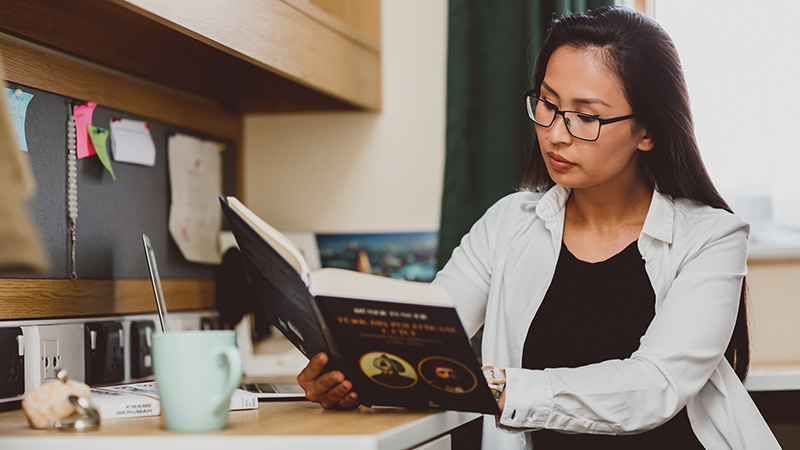International Relations (Distance Learning)
MA or PGDip or PGCert
Start dates: September 2024
Full time: MA: 12 months; PGDip: 9 months; PGCert: 9 months
Part time: MA: 24 months; PGDip: 18 months; PGCert: 18 months
Location: Distance learning
Department(s): School of Law and Social Sciences
Overview
Explore pressing issues and power struggles in today’s globalised world. You’ll examine how states and societies cooperate on our international relations postgraduate course, and question world politics and the global economy.
You’ll get to know the key players, organisations, and policies that underpin world economies. You’ll challenge their aims. And discuss the obstacles they face. You’ll explore how systems impact individuals like refugees and protesters, as well as global problems like the climate emergency.
You’ll have the freedom to pursue what interests you. This might involve scrutinising the Paris Agreement or analysing Fair Trade. Or examining social movements like the Yellow Vests, Flygskam, or pro-democracy activism in Hong Kong.
You can also study this course on-campus

Why Oxford Brookes University?
-
A political epicentre
In Oxford, you’ll be at the heart of modern political discourse – there are active discussions on racism and colonialism, and refugee action.
-
Focus on you
You’ll be taught in small classes, always getting the attention and support you need.
-
An accessible programme
You can join this course without having studied our international relations undergraduate degree.
-
Taught by experts
Your tutors are active researchers in their fields of study, and they’ll share their expertise with you.
-
More than essays
Assessment methods also include presentations, projects, reports and a dissertation, and you’ll receive feedback throughout the year.
Course details
Study modules
The modules listed below are for the master's award. For the PGDip and PGCert awards your module choices may be different. Please contact us for more details.
Please note: As our courses are reviewed regularly as part of our quality assurance framework, the modules you can choose from may vary from those shown here. The structure of the course may also mean some modules are not available to you.
Research
Our vibrant research culture is driven by a thriving and collaborative community of academic staff and doctoral students. from across the globe.
83% of International Relations and Politics research was recognised internationally, and rated as either excellent or world leading in the 2014 Research Excellence Framework.
Our research is organised within the Centre for Global Politics, Economy and Society.
Within the Centre we run four dedicated research groups:
- Critical Security Studies
- International Political Theory
- Cultures and Identities
- State and Society.
As well as meeting to discuss and analyse central texts in the field each group undertakes a number of activities including:
- organising work-in-progress seminars
- offering support and feedback for external grant applications
- hosting visiting fellows
- sponsoring seminars and symposia.
Find out more by visiting our web pages and browsing our staff profiles.

Careers
After completing the course, you’ll have picked up sought-after transferable skills including project management, critical analysis, problem-solving, and communication. You’ll have developed a good intercultural awareness and be ready for a career in a field like international development, corporate social responsibility, or with NGOs.
Our graduates now have roles including:
- Research Analyst at Africa Risk Consulting
- Senior Consultant at the Norwegian Defence Materiel Agency
- Communications Officer at Save the Children
- Parliamentary Assistant to a Westminster MP
- Commercial Manager in the net zero energy sector.
You could also progress further in academia and research.
Our Staff
Dr Molly Cochran
Molly has research and teaching interests in international relations theory, international political thought, American pragmatism, human rights, gender and IR, and democratic global governance.
Read more about MollyDr Stephen Hurt
Stephen lectures on international development and South African politics.
Read more about StephenRelated courses
Entry requirements
Specific entry requirements
Students are normally required to have at least a second-class honours degree from a university in the UK or an equivalent qualification from countries outside the UK. The degree should be in an appropriate discipline.
Please also see the University's general entry requirements.
English language requirements
IELTS 6.5 with 6.0 in reading, writing, speaking and listening.
Please also see the University's standard English language requirements.
Pathways courses for international and EU students
We offer a range of courses to help you meet the entry requirements for your postgraduate course and also familiarise you with university life in the UK.
Take a Pre-Master's course to develop your subject knowledge, study skills and academic language level in preparation for your master's course.
If you need to improve your English language, we offer pre-sessional English language courses to help you meet the English language requirements of your chosen master’s course.
English requirements for visas
If you need a student visa to enter the UK you will need to meet the UK Visas and Immigration minimum language requirements as well as the University's requirements. Find out more about English language requirements.
Terms and Conditions of Enrolment
When you accept our offer, you agree to the Terms and Conditions of Enrolment. You should therefore read those conditions before accepting the offer.
International qualifications and equivalences
How to apply
Application process
Tuition fees
Questions about fees?
Contact Student Finance on:
Tuition fees
Fees quoted are for the first year only. If you are studying a course that lasts longer than one year, your fees will increase each year.
The following factors will be taken into account by the University when it is setting the annual fees: inflationary measures such as the retail price indices, projected increases in University costs, changes in the level of funding received from Government sources, admissions statistics and access considerations including the availability of student support.
How and when to pay
Tuition fee instalments for the semester are due by the Monday of week 1 of each semester. Students are not liable for full fees for that semester if they leave before week 4. If the leaving date is after week 4, full fees for the semester are payable.
- For information on payment methods please see our Make a Payment page.
- For information about refunds please visit our Refund policy page
Additional costs
Please be aware that some courses will involve some additional costs that are not covered by your fees. Specific additional costs for this course are detailed below.
Optional costs
| Additional costs | Amount (£) |
|---|---|
It’s your responsibility to cover print / binding costs where coursework submission is required. Please note that a lot of the coursework is now submitted online. |
From £30 |
| You may choose to purchase books to support your studies. Many books on our reading lists are available via the Library, or can be purchased secondhand. | £20-60 per book |
Accommodation fees in Brookes Letting (most do not include bills) |
£94-265 per week |
Accommodation fees in university halls (bills included, excluding laundry costs) |
£122-180 per week |
Graduation costs include tickets, gowning and photography. Gowns are not compulsory but typically students do hire robes, starting at £41. |
Typically £0-200 |
Students are responsible for their own travel to and from university for classes. BrookesBus travel is subsidised for full-time undergraduate students that are on a course with a fee of £9,250 or more, or living in an Oxford Brookes hall of residence. There is an administration fee for the production of a BrookesKey. |
From £10 |
Funding your studies
Financial support and scholarships
Featured funding opportunities available for this course.
All financial support and scholarships
Programme changes:
On rare occasions we may need to make changes to our course programmes after they have been
published on the website. For more information, please visit our
changes to programmes page.

